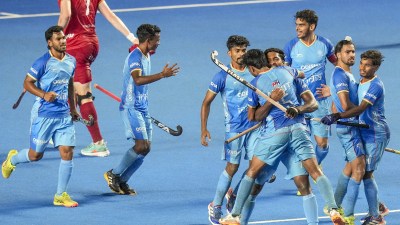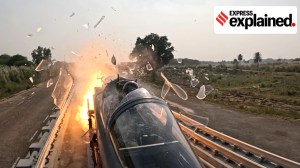“The Indus Waters Treaty, in many ways, is a very unique agreement. I cannot think of any agreement in the world where a country has allowed its major rivers to flow to the next country without having rights on that,” Jaishankar said.

He then cited a speech made by Nehru in Parliament on November 30, 1960, to claim that the former PM was more concerned about Pakistan’s welfare than India’s.
Claims that the Indus Waters Treaty was unfair to India are as old as complaints in Pakistan that they got a bad deal. What is the rationale behind the claim that ‘Pakistan got 80% of water’ under the deal? What exactly did Nehru say in the speech Jaishankar cited? We explain.
What did Jaishankar say?
The Union Minister said he would mention three observations by Nehru.
“First, he [Nehru] says, I would like to know, is this House now to judge the quantum of supply of water or the quantum of money to be given?.. So the Prime Minister of India then is telling the Parliament, you cannot be a judge of the quantum of water, you should not be looking at how much money we are giving to Pakistan….The Prime Minister then goes on… honourable members have been saying that there was a partition, what has happened is none of our lookout, we should not give them anything… If we follow that approach, it would mean turning a great part of West Punjab into almost a wilderness…So the Prime Minister is saying… should put the interests of Pakistani Punjab. Sir, not a word about the interests of the kisaan [farmer] of Kashmir, of the people of Punjab.”
Jaishankar then further quoted Nehru to say, “…people are saying, you are paying money. We felt that in the circumstances, this is the right payment, and we purchased a settlement, if you like, we purchased peace, and it is good for both countries. In 1960, sir, he says he purchased peace. We did not purchase peace, sir. It was a purchase of appeasement.”
Story continues below this ad
Division of water under the Indus Waters Treaty
The Indus Waters Treaty was negotiated for almost 10 years, with the World Bank acting as a neutral facilitator. The treaty was negotiated not by politicians and diplomats, but by civil engineers. It was the engineers who decided to bifurcate the Indus rivers system into eastern (Sutel, Beas, Ravi) and western rivers (Indus, Jhelum, and Chenab) so as to make the division easier. Otherwise, the six rivers would have needed six agreements, making the negotiations stretch yet longer.
Uttam Kumar Sinha, Senior Fellow at the Manohar Parrikar Institute for Defence Studies and Analyses, New Delhi, who has written two books on the treaty, had earlier told The Indian Express that it was Pakistan’s President Ayub Khan who started the claim that his country got 80 per cent of the water under the Treaty, to claim credit for himself.
“Under the treaty, Pakistan got a higher volume of water. The average annual flow of water in the ‘western rivers’ (135.6 million acre feet) is more than four times that of the eastern rivers (32.6 maf). But India needed the exclusive use of the eastern rivers, which the treaty secured for us. India has since built dams and other water projects on these rivers, including the Bhakra Nangal dam and the Rajasthan canal project now called the Indira Gandhi Canal, which have helped irrigate Punjab, Haryana, and Rajasthan,” Sinha said.
“In return, Pakistan got a much larger portion of the flow of water from the three western rivers but India was entitled to certain use on these rivers such as domestic use, non-consumptive use, agriculture use and generation of hydro-electric power,” he added.
Story continues below this ad
Under the treaty, “ non-consumptive use” means “any control or use of water for navigation, floating of timber or other property, flood protection or flood control, fishing or fish culture, wild life or other like beneficial purposes, provided that, exclusive of seepage and evaporation of water incidental to the control or use, the water (undiminished in volume within the practical range of measurement) remains in, or is returned to, the same river or its Tributaries.”
Apart from the division of the waters, India also agreed to pay Pounds Sterling 62,060,000 (around Rs 83 crore) in 10 instalments to Pakistan to build canals and irrigation works, which after Partition had come to India.
This was a portion of the whole amount needed by Pakistan, and around 60% of this amount came in grants from other countries, including West Germany, the US, the UK, Canada, New Zealand, and the World Bank.
What Nehru said in Parliament on Indus Waters Treaty
In a long speech, Nehru largely said that the figures arrived at had come after long discussions, and it was difficult to pass opinions on them off-hand in Parliament. He said if all papers related to the treaty had to be presented in the House, a truck would be needed to carry them, and that he would like to congratulate the engineers who fought for India’s interests. [Selected Works of Jawaharlal Nehru, Volume 64]
Story continues below this ad
“Naturally, one can always say that instead of Rs. 80 crores if we pay Rs.50 crores we will be gainers by Rs 30 crores and if we do not pay anything at all we will be gainers by Rs 80 crores…The decision that we get a free supply of water after that ten-year period and fairly free supply before that within certain limits is a tremendous gain… the mere fact that this has taken twelve years would at least convince the House that nothing, not a comma, not a full stop has been accepted without the longest argument and the closest attention to each detail… I have to congratulate those who had to deal with it, specially our engineers who were there and who fought for India’s interests strenuously. They knew—they were experts in this matter—how much water is necessary..,” he said.
Nehru also said that despite the Partition, letting a section of Pakistan become a wilderness was hardly desirable, and that in the absence of a Treaty, India too would not be able to benefit from these waters.
“Some hon. Members have been saying that there was partition, what has happened is none of our lookout, we should not give them anything. That is neither a strictly legal, constitutional nor just approach to this problem. If we follow that approach it would mean turning a great part of West Punjab into almost a wilderness…What is more important is not being able to profit ourselves by it, because we cannot build up all these things, if all these remain in a spirit of uncertainty and lack of decision,” he said.
Even today, India is not in the position to majorly control the flow of water into Pakistan, because we do not have the dams needed. However, dam construction in the region is being taken up.








































